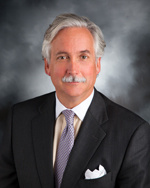The leaders of University of Iowa Health Care and Mercy Medical Center in Cedar Rapids jointly announced today, Wednesday, April 4, plans to collaborate to enhance the health of communities in the Corridor.

“This relationship will enable both organizations to continue to deliver high-quality health care in patient-centered environments while we work together to enhance community health and services in the Corridor,” says Tim Charles, Mercy Medical Center CEO. “At the same time, both organizations will remain independent and retain the flexibility to respond and adapt to changes in health care. This approach offers the best of both worlds.”
The leadership of the institutions indicates this will enhance coordination and integration of care and offer patients a broader, more comprehensive range of health care choices. Both organizations also cite the many challenges facing the health care profession, including escalating costs, fragmented care, and the uncertainties of evolving health care reform efforts, as key reasons for this collaborative effort.

“This collaboration builds upon a long-standing relationship between two nationally recognized and award-winning organizations that are both deeply invested in the communities we serve,” says Jean Robillard, M.D., vice president for medical affairs at the UI. “We share a commitment to providing access to high-quality health care close to home with a focus on building healthier communities. This collaboration is very much a key part of UI Health Care’s mission to serve all Iowans throughout the state.”
For example, care coordination is a major aspect of the Medicare accountable care organization (ACO) that Mercy and UI Health Care are forming. The Medicare ACO is a new model of care for Medicare beneficiaries that emphasizes access, quality, and coordination of all needed health care services, while working to decrease costs. Through the Medicare ACO, Mercy and UI Health Care will be able to develop a better-integrated system of care. These efforts through the Medicare ACO will improve disease screening and prevention and delivery of care for acute illness.
"This collaboration builds upon a long-standing relationship between two nationally recognized and award-winning organizations that are both deeply invested in the communities we serve."
—Jean Robillard
In addition, Mercy and UI Health Care are exploring opportunities to work together to treat patients affected by end stage renal, or kidney, failure. Patients will have access to the full range of options for dialysis services, including inpatient, outpatient, and home-based care.
Patients who require a kidney transplant will also benefit from the care and expertise provided at the UI Organ Transplant Center, which has one-year and three-year kidney transplant survival rates that rank among the best in the nation.
Another key benefit of the collaboration involves Mercy’s conversion to Epic, an electronic medical record system already in use at UI Hospitals and Clinics. As an early adopter of Epic more than three years ago, UI Health Care medical information specialists will work with Mercy on ways to implement Epic in a faster, more efficient, and lower-risk manner as installation begins this summer. With both organizations using Epic, clinicians will have secure, online access to comprehensive patient health records to support safe, effective, and more efficient care at any Mercy or UI Health Care location.
UI Health Care and Mercy Medical Center are looking forward to bringing their individual strengths to this new collaboration. Mercy Medical Center has been recognized as one of the nation's leading providers of high-quality and cost-effective health care and a Top 100 hospital in patient experience. UI Health Care is recognized nationally for its top-ranked clinical care in nine adult and 10 pediatric specialties; its well-regarded College of Medicine with many programs ranked in the Top 20; and more than $220 million in annual research funding.
Full details of the collaboration are still being finalized.